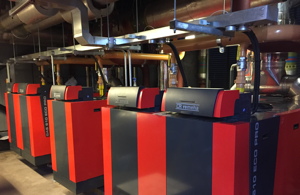No time to be complacent

The energy-efficiency clock is ticking for private rented sector landlords as MEES looms. Chris Meir discusses the potential impact and says now is the time to look for some quick wins in energy-using areas such as heating.
The Minimum Energy Efficiency Standard (MEES) comes into effect this April as the government looks to improve the energy performance of our least efficient building stock. Put simply, the legislation makes it unlawful for landlords to let properties across England and Wales with an Energy Performance Certificate (EPC) of F and G unless all possible cost-effective energy-efficiency improvements have been made.
Just how far reaching is MEES? It is estimated that the regulations could affect a fifth of all non-domestic property, equivalent to around £165.49 billion of the UK commercial property market. The office sector was found to have the highest proportion of sub-standard units, with 23% rated F or G, and 18% rated E.
Despite being well publicised, landlords are still ‘complacent’ about the impact of the new environmental regulations, according to a report by Property Week. Fail to comply, however, and landlords could risk a hefty fine of up to £150,000. Then there’s the possibility of reputational damage, as non-compliance will be published.
So with the clock ticking, how can landlords avoid being an April Fool?
 |
| The plant room at 65 Fleet Street where two Remeha Gas 610 Eco Pro and one 310 Eco Pro have replaced 30-year-old boilers to improve the energy performance of the office building |
The first recommendation would be to check the building’s EPC and commission an up-to-date report. Recent research from consultants Arbnco indicated, more landlords than previously due to changes in EPC calculations. The software simulation company re-ran 3,500 EPCs using current Simplified Building Energy Model (SBEM) software. A third of commercial real estate with EPCs rated D and E – all well managed – dropped into the F and G bands. So, there’s a strong possibility that a greater percentage of less-well managed portfolios could fall into lower EPC bands.
The second step, given the fast approaching deadline, is to identify quick wins that will raise substandard buildings into the D or E band. Upgrading to more energy-efficient boiler technology is one cost-effective option that delivers rapid ROI.
As a large user of energy in a building, heating is frequently recommended as a starting point. And with many non-domestic buildings still relying on non-condensing commercial boilers for heating, replacing older models with condensing boilers and upgrading the controls are recognised energy saving quick wins.
Why? Condensing boilers are up to 11% more efficient than non-condensing boilers. So while a 25-year-old non-condensing boiler is likely to achieve just 70% gross efficiency at best, with the latest advanced condensing boilers the figure could increase to up to 97%. Indeed, reports by the Green Construction Board and Currie & Brown (formerly the Sweett Group) for the Investment Property Forum (IPF) list condensing boilers and controls as cost-effective measures to lift the EPC band of lower rated properties.
Potential efficiency is one thing but the actual performance comes down to how the equipment is applied. To maximise real world efficiencies and savings, condensing boilers must be installed in such a way that they can fully condense. So, when switching from non-condensing to condensing boiler technology, it’s essential to consider fundamental design factors like radiator circuit temperatures and weather compensation control.
Operational performance is the next consideration. We recommend including time, optimisation and full temperature controls.
 |
| Freshfields Offices at 65 Fleet Street |
Beyond the quick win, condensing boilers bring additional benefits for landlords as their compact dimensions lend themselves to modular arrangements. This makes maintenance and servicing easier while ensuring consistently reliable high performance.
Live refurbishments are also often possible when installing or replacing condensing boilers – a further advantage for landlords required by terms in leases to compensate any tenants subjected to disruption. Where a lease may be about to expire but the full planned refurbishment of the property is some years away, a ‘one off’ boiler upgrade may prevent the building from falling into disuse.
For landlords considering future larger scale improvements, the versatility of condensing boilers makes them a compelling option. Whether operating alone or in conjunction with low to zero carbon technologies like Combined Heat and Power (CHP) and gas absorption heat pumps (GAHPs), they are a tried-and-tested solution.
The building services industry is well placed to help landlords identify and implement effective measures to improve energy performance for compliance and beyond. But the clock is ticking. The time to act is now.
Chris Meir is sales director at Remeha







